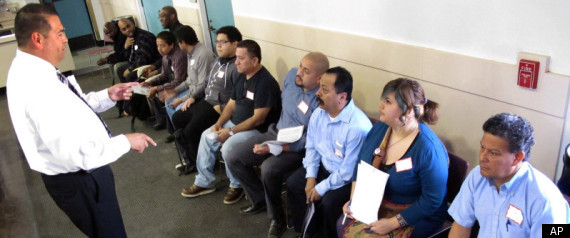WASHINGTON -- People receiving long-term unemployment insurance will get fewer weeks of benefits as a federal program is phased out early next month in several states.
The federal Extended Benefits program, which in states with high-unemployment rates grants claimants out of work for a long period of time a final 13 to 20 weeks of benefits, will be phased out on April 7 in Kansas, Kentucky, Massachusetts, Missouri, Ohio, Oregon, South Carolina, Tennessee and Wisconsin, according to an analysis by the National Employment Law Project, a worker advocacy group.
State labor departments were notified of the changes by the U.S. Labor Department in a complex March 5 memo. States, in turn, are trying to explain what's going on to those who will no longer receive checks through the Extended Benefits program.
In February, Congress reauthorized Extended Benefits for the rest of the year but did not allow states to keep the program if their unemployment rates had not risen compared with a corresponding period period three years ago. Because unemployment rates have slowly declined since 2009, the program will be completely phased out over the course of this year.
But Congress did soften the impact of benefit cut for any state where the unemployment rate is above 8.5 percent: Some states slated to lose Extended Benefits next month will grant claimants extra weeks through the federal Emergency Unemployment Compensation program -- for an additional 10-week benefits boost until the end of May.
According to a memo from the Congressional Research Service, Kentucky, Oregon, South Carolina and Tennessee will lose Extended Benefits but will be eligible for the 10 extra weeks, which are added to the fourth and final "tier" of the Emergency Unemployment Compensation program.
By the end of the year, the maximum length of combined state and federal benefits will decline from 99 weeks to 73 weeks.
The February law also created new work-search requirements for claimants in federal programs. While nearly every state already requires applicants to actively search for work to receive benefits, federal law reaffirms the requirement and also forces workers to maintain detailed records of job applications. Additionally, states are now required to assess claimants' work skills and try to connect them with jobs if they tap federal benefits after having already exhausted the maximum six months of state benefits.
Congress also said states could drug test certain workers applying for benefits, but the Labor Department has not yet issued a rule clarifying which workers states can force to do so.
Original Article
Source: Huff
Author: Arthur Delaney
The federal Extended Benefits program, which in states with high-unemployment rates grants claimants out of work for a long period of time a final 13 to 20 weeks of benefits, will be phased out on April 7 in Kansas, Kentucky, Massachusetts, Missouri, Ohio, Oregon, South Carolina, Tennessee and Wisconsin, according to an analysis by the National Employment Law Project, a worker advocacy group.
State labor departments were notified of the changes by the U.S. Labor Department in a complex March 5 memo. States, in turn, are trying to explain what's going on to those who will no longer receive checks through the Extended Benefits program.
In February, Congress reauthorized Extended Benefits for the rest of the year but did not allow states to keep the program if their unemployment rates had not risen compared with a corresponding period period three years ago. Because unemployment rates have slowly declined since 2009, the program will be completely phased out over the course of this year.
But Congress did soften the impact of benefit cut for any state where the unemployment rate is above 8.5 percent: Some states slated to lose Extended Benefits next month will grant claimants extra weeks through the federal Emergency Unemployment Compensation program -- for an additional 10-week benefits boost until the end of May.
According to a memo from the Congressional Research Service, Kentucky, Oregon, South Carolina and Tennessee will lose Extended Benefits but will be eligible for the 10 extra weeks, which are added to the fourth and final "tier" of the Emergency Unemployment Compensation program.
By the end of the year, the maximum length of combined state and federal benefits will decline from 99 weeks to 73 weeks.
The February law also created new work-search requirements for claimants in federal programs. While nearly every state already requires applicants to actively search for work to receive benefits, federal law reaffirms the requirement and also forces workers to maintain detailed records of job applications. Additionally, states are now required to assess claimants' work skills and try to connect them with jobs if they tap federal benefits after having already exhausted the maximum six months of state benefits.
Congress also said states could drug test certain workers applying for benefits, but the Labor Department has not yet issued a rule clarifying which workers states can force to do so.
Original Article
Source: Huff
Author: Arthur Delaney

No comments:
Post a Comment